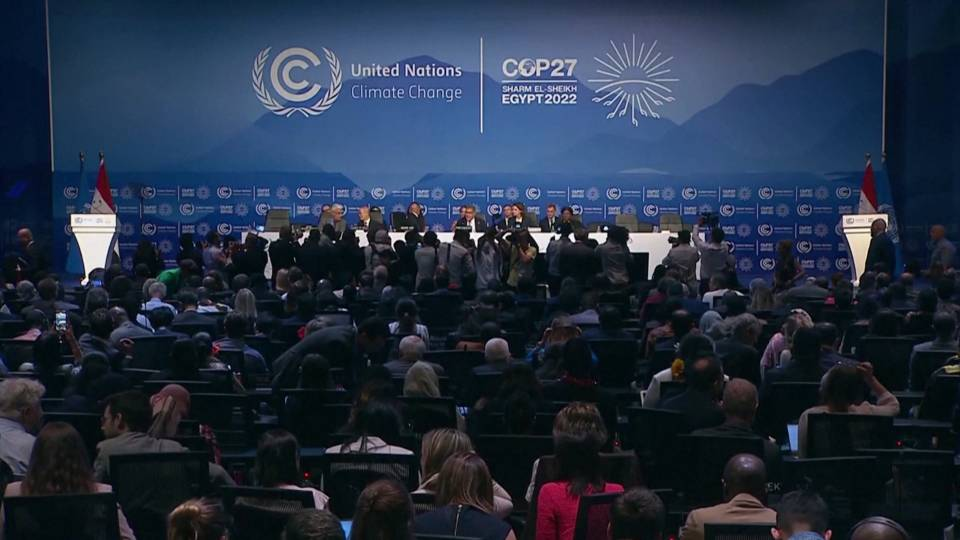
UN Secretary-General Antonio Guterres is pictured with world leaders at the COP27 climate summit in Sharm el-Sheikh, Egypt [Mohammed Salem/Reuters]
Cairo, November 7 (RHC)-- United Nations chief Antonio Guterres has warned world leaders gathered at the COP27 climate summit in Egypt that humanity faces a stark choice between working together or “collective suicide” in the battle against global warming.
Nearly 100 heads of state and government are meeting in the Red Sea resort of Sharm el-Sheikh, facing calls to deepen emissions cuts and financially back developing countries already devastated by the effects of rising temperatures. “Humanity has a choice: cooperate or perish,” Guterres told the summit on Monday.
“It is either a climate solidarity pact or a collective suicide pact,” Guterres said, urging richer polluting nations to come to the aid of poorer countries least responsible for the emission of heat-trapping gases.
Nations worldwide are coping with increasingly intense natural disasters that have taken thousands of lives this year alone and cost tens of billions of dollars – from devastating floods in Nigeria and Pakistan to droughts in Kenya, Somalia and the United States and unprecedented heatwaves across three continents.
“We have seen one catastrophe after another,” said Egyptian President Abdel Fattah el-Sisi, whose country is hosting the annual gathering running until November 18. “As soon as we tackle one catastrophe another one arises – wave after wave of suffering and loss. “Is it not high time to put an end to all this suffering?”
But a multitude of other crises, from Russia’s invasion of Ukraine to soaring inflation and the lingering effects of the COVID-19 pandemic, has raised concerns that climate change will drop on the priority list of governments.
Guterres, however, told leaders climate change could not be put on the “back burner.” He called for a “historic” deal between rich emitters and emerging economies that would see countries double down on emissions, holding the rise in temperatures to the more ambitious Paris Agreement target of 1.5 degrees Celsius (2.7 degrees Fahrenheit) above the pre-industrial era.
Current trends would see carbon pollution increase 10 percent by the end of the decade and Earth’s surface heat up by 2.8C (5F). Despite decades of climate talks – the Egypt COP is the 27th Conference of the Parties – progress has been insufficient to save the planet from excessive warming as countries are too slow or reluctant to act, he noted.
“Greenhouse gas emissions keep growing. Global temperatures keep rising. And our planet is fast approaching tipping points that will make climate chaos irreversible,” he said. “We are on a highway to climate hell with our foot still on the accelerator.”
The UN chief asked countries to agree to phase out the use of coal, one of the most carbon-intense fuels, by 2040 globally, with members of the Organisation for Economic Cooperation and Development (OECD) hitting that mark by 2030.
The UN secretary-general said the target should be to provide renewable and affordable energy for all, calling on top polluters China and the United States in particular to lead the way. He also said it was a “moral imperative” for richer polluters to help vulnerable countries.
U.S. President Joe Biden, whose country ranks second on the top polluters’ list, will join COP27 later this week after midterm elections on Tuesday which could put Republicans hostile to international action on climate change in charge of Congress.
French President Emmanuel Macron urged the U.S., China and other non-European rich nations to “step up” their efforts to cut emissions and provide financial aid to other countries. “Europeans are paying,” Macron told climate campaigners from France and African countries on the sidelines of COP27. “We are the only ones paying.”
On Sunday, the heads of less wealthy nations won a small victory when delegates agreed to put the controversial issue of compensation for “loss and damage” on the summit agenda. Pakistan, which chairs the powerful G77+China negotiating bloc of more than 130 developing nations, has made the issue a priority.
The U.S. and the European Union have dragged their feet for years on the proposal, fearing it would create an open-ended reparations framework.
Guterres said COP27 must agree on a “clear, time-bound roadmap” for loss and damage that delivers “effective institutional arrangements for financing.” “Getting concrete results on loss and damage is a litmus test of the commitment of governments to the success of COP27,” he said.
Rich nations will also be expected to set a timetable for the delivery of $100bn per year to help developing countries green their economies and build resilience against future climate change. The promise is already two years past due and remains $17bn short, according to the OECD.
Security is tight at the meeting, with Human Rights Watch saying authorities have arrested dozens of people and restricted the right to demonstrate in the days leading up to COP27.

